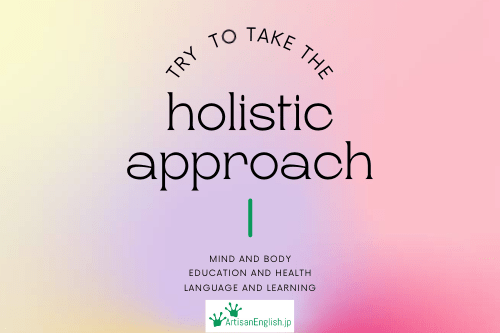
YouTube / iTunes / Spotify / Radio Public / Pocket Casts / Google Podcasts / Breaker / Overcast
Listen to ArtisanEnglish.jp posts & lesson intros here.
Word of the Day: Holistic
Estimated reading time: 3 minutes
These days meditation, the slow life and holism are catchwords indicating society’s desire to change the way we live and do things.
As a result of this way of thinking, people try to take a holistic approach to solve their personal issues and life’s problems in general.
This means not only dealing with the issue or its cause but treating the entire thing or someone.
For example, if you have a stomachache caused by stress, a doctor can give you some medicine for that.
If you take a holistic approach, you’ll find the exact cause of the stress and eliminate that, thus removing both the stomachache and its cause.
This way, you do not need medicine.
That’s an elementary example of the holistic approach.
You can also follow this mindset to improve your second language ability.
Many students take English for Special Purposes (ESP) classes in which they focus on business English, Medical English etc.
The challenge is that they only know specific English vocabulary for specific situations and can neither converse nor feel comfortable in conversations not focusing on these topics.
To speak English fluently, you must take a holistic approach.
That means you need to open your mind and learn everything.
Read, read, read anything and everything you can set your eyes on.
Listen to podcasts or live radio on a wide range of topics as often as you can.
When you take English lessons, take the ones on topics you’ve never discussed before or know nothing about.
The only way to learn new vocabulary is to expose yourself to it.
Finally, write.
Writing allows you to bring everything you have learned together on the screen in your own words.
Taking a holistic approach to life and learning will result in improvement all around.
Flesch-Kincaid Readability Test
This post is understandable by someone with at least an 8th-grade education (age 13 – 14).
On the Flesch-Kincaid reading-ease test, this post scores 64.
The easier a passage is to read, the higher the score on a scale of 0 – 100.

